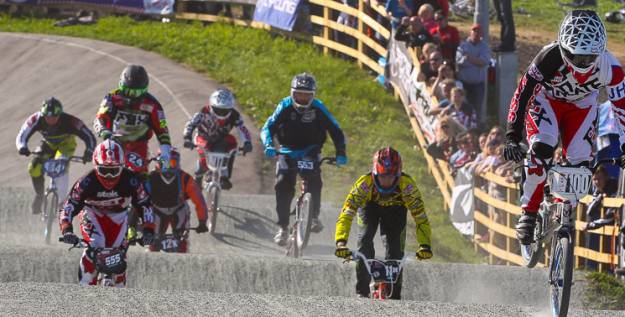British Cycling's Major Events - From Concept to Race Day Delivery
Posted: 9 October 2009
We look at the complex process behind securing and running major international cycling events in the UK and at British Cycling's central role in this process.
An increasing number of major cycling events have been visitng these shores in recent years. World Championships and World Cup events have brought huge crowds, sponsorship and media interest to complement the successes of the GB Team. With the BMX World Championships coming to Birmingham in 2012, the Paracycling Track Worlds at Manchester this autumn, the Cross-Country World Cup visiting Yorkshire as early as 2010, and the Track World Cup now a regular visitor to Manchester, this trend looks set to continue.
A full velodrome - another major event comes to Manchester
The benefits of hosting world class events are obvious: watching the sport's stars inspires young and old alike to participate; big events also attract investment in infrastructure and often leave a legacy of new facilities; and for our elite athletes there are clear performance benefits to competing at home in front of a partisan crowd.
But how do major events come to the UK? They certainly don't materialize overnight! As you might expect, it's all down to hard work, careful planning and the co-ordination of a network of interested parties.
British Cycling's Events Director, Jonny Clay and Major Events & Projects Manager Sam Matthews are key figures in the process and Sam identifies three key stages: "There's the initial identification of an event we want to run; there's the bidding; and finally there's the actual organisation and delivery of the event."
IDENTIFICATION OF EVENT OPPORTUNITIES
British Cycling's Events team has become very experienced and the organisation's approach to securing and putting on major events has evolved considerably in the last couple of years. In the last year or so we've reached the stage where British Cycling is delivering major international events using its own staff skills and resources - the 2008 Track World Cup in Manchester saw British Cycling, ably assisted by an external promoter, play a key role in the delivery of an event of that size for the first time. This means that the buck stops with British Cycling, but in turn it also means the organisation can concentrate on making the event work for the good of cycling as a whole. There are additional benefits for members and a controllable legacy for the sport as British Cycling effectively manages the event overall, bringing in key technical personnel, support service agencies and partners to help deliver it.
A huge amount of planning and time goes into the delivery of any major event. It generally begins with an initial assessment of what future event promotion opportunities are available. The UCI (World Governing Body) controls which Nations are awarded international events and employs a bidding process to identify their best options.
Back at British Cycling HQ, Jonny and Sam regularly meet with the GB Cycling Team and key funding partner, UK Sport, to look at the international racing calendar several years in advance. The GB Team has a lot to gain from major events visiting our shores: in 2008, the World Track Championships were held in Manchester, just months before the Beijing Olympics, allowing the GB athletes the best possible pre-Games qualification and competition opportunities in front of a home crowd. Similarly, the 2012 World BMX Championships - planned for Birmingham - will send our riders on to the London Games with the huge boost of having just competed at the highest level in this country. So the team's input is an important part of the planning.

FINDING A HOST AND ASSEMBLING THE BID
Returning to the process, having made an initial assessment of the upcoming promotional opportunities, the next step is to move towards identifying a suitable venue. This generally involves a competitive tendering process where towns, cities or regional funding bodies (Regional Development Agencies) present their visions of how an event would work if they won the bid and how they would use it to benefit the sport and the local community.
Looking at the Birmingham 2012 BMX Worlds bid, the city was committed to building two new BMX tracks on the back of the event, supporting British Cycling and UK Sport's objectives of improving performance, participation and securing a legacy for the sport. With business planning and budgeting elements also important to the bid, representatives of the venues are normally interviewed and a decision made immediately afterwards. British Cycling and the venue's representatives then jointly present a detailed business plan to UK Sport.
UK Sport is a major funding partner in many Olympic discipline events and one with a keen eye on the wider benefits for the sport. As Sam says, "with UK Sport, it's a competitive situation as they regularly receive major event funding bids from other sports. There's a limited funding pot available, but we've shown we can deliver well budgeted, well planned events and offer a holistic package of a great event, benefiting GB riders as well as the local community."
British Cycling, UK Sport and the chosen city or venue now have a framework within which the event can be organised. The next step is to take this joint vision to the UCI, where it will be assessed against competing bids from around the world. A full, detailed bid is assembled. This is our chance to sell the event and say why the event should come to us in preference to the possibly 5 or 6 other nations involved in the bidding. From the UCI's perspective it's all about quality of the venue, rider experience, TV coverage, strong marketing, and financial security.
A high-quality bid presentation is considered by the UCI at commission level. The commissions then make their recommendations to the UCI's management committee, who make the final decision. British Cycling now has a very strong relationship with the UCI, through all the major event work we have done with them in recent years. The two organisations are in contact on a weekly basis and that, combined with a growing reputation for putting on well-organised events, puts this country in a strong position when the bids are being assessed.
PLANNING AND DELIVERY
If the bid is successful, the emphasis suddenly changes to delivery and planning. In the majority of cases, this will already have started, even before the bid is approved. The small team of bid writers and bid negotiators suddenly grows into a far bigger organizing group.

A plan view of the Dalby World Cup race village
The upcoming Cross-Country World Cup to be held in Dalby Forest in 2010 illustrates just how broad and far reaching this final stage of the process is. Organisation and attendant responsibilities break into five main strands:
Firstly, there's the venue. Venue Manager, Alan Eaves, represents the Forestry Commission, who own and run Dalby Forest. Amongst Alan's responsibilities are health and safety during the event, managing the movement of spectators to the venue and ensuring spectators experience the wider opportunities this fantastic forest has to offer.
Secondly, there's the Commercial and Marketing operation, which sits under British Cycling's Senior Marketing Manager, Andrew Lowe. His responsibilities include making sure that the TV production and broadcasting meet with the UCI's expectations and that the production company and broadcaster are working in concert. Andrew will also be making sure that the event draws as much revenue as possible from sponsorship, exhibitors and corporate hospitality. Marketing and branding underpin the look and presentation of the event. Meanwhile, there's a growing interaction with the media - both directly and via PR - in the run up to and during the event.
The third strand sits with Competition Manager, Martyn Salt. Martyn and his team are responsible for the event running as effectively and smoothly as possible from the competitors' and race officials' perspectives. He recruits co-ordinates and briefs the numerous commissaires, race officials and course marshals who make the racing happen on the day. He also puts in place the anti-doping and medical arrangements and looks after the maintenance of the course during the event. Finally, he ensures that the timing and results systems are in place for race day.
Phil Heselwood, from British Cycling's Major Event's team, is in charge of the fourth strand, as Operations Manager. Ably supported by Nicola Rolph, his responsibilities encompass much of the event's infrastructure and essential services, including the design and set-up of the event village and accommodation, transport, catering, IT and telecommunications. There's also ticketing, accreditation and hospitality, plus details like event clothing.
The final part of this five-piece jigsaw brings in the Technical Consultant, Simon Burney, who is also the UCI's official Technical Delegate at the event. He looks after the UCI's interests as well as liaising with the various teams taking part in the event. In the run up to the event, he also ensures that the course design meets the requirements of the UCI, venue owners, competitors and TV.
Each major event is therefore a complex, multi-stranded project, which grow rapidly from concept to reality. From initial work done around Sam and Jonny's desks, the event rapidly mushrooms into a paper-based plan with more and more people and agencies drawn into the various bidding and approval processes, before the final explosion of actual event planning, logistics and delivery. Finally, at the end of it all, there's another world-class event showcasing the organization expertise now available in this country. And for many, the organization goes unnoticed, unless something goes wrong! So, next time you're at a big event, spare a thought for the army of people who have worked to put it on. Ironically, they will be hoping you don't even think about them as you watch some of the world's best cyclists strutting their stuff.
Further Information
You can buy tickets for the UCI Track Cycling World Cup Classics (30 October to 1 November 2009, Manchester) and UCI Para-Cycling Track World Championships (6 to 8 November, Manchester) NOW via www.ticketmaster.co.uk
For more info on some of the major events just around the corner, have a look at these event websites:
www.para-cyclingworldchamps.co.uk
www.trackworldcup.co.uk
www.yorkshiremtbworldcup.co.uk










